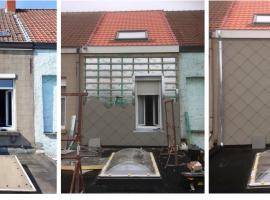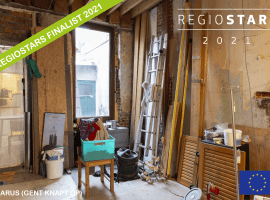Ghent Knapt Op has included a larger and diversified target group of home owners in order to improve more housing conditions for more people that fall between the cracks of the housing support system. Besides captive owners, Ghent Knapt Op’s primary target group, elderly homeowners have been included also as a group that are in need of urgent housing attention.

In particular, 10 homes out of the 85 belong to elderly homeowners that are in the process of renovation as part of the pilot housing project Ghent Knap Op. This target group includes homeowners over the age of 55 years that owns their home, they are unable to afford repairs or necessary improvements and additionally are in need of house adaptations to meet their physical needs (according to age and vulnerability). Most homes are in need of urgent technical repairs such as roof repairs and insulation, heating, etc. but for the majority of the group it is advised to make home adaptations as it provides prevention and lifelong independent living in their own home environment. Specific home adaptations are proposed for each home and according to the different physical and emotional needs of the owners.
‘Including accessibility in the housing upgrades should be part of all target groups renovation criteria not only the elderly homeowners. '
Els Devriendt, member of the steering committee Ghent Knapt Op
In addition most of the homes that belong to the elderly have low market value leaving them unable to sell and buy or find an alternative housing option in the city thus becoming prisoners of their own home. Most of the Elderly live with a small pension, have serious health issues and are unable to find other options as they feel insecure because of the lack of knowledge and social network hopeless. Many face several disabilities, mental as well as physical, therefore these housing adaptations have been imperative in the renovations process. The outcome of the renovation has a positive effect on the physical functioning, but also on the mental well-being. e.g. some participants mentioned a feeling of shame concerning the condition of their house, feeling of being left out, barriers in receiving visitors in their house. This means we see a positive impact of the renovation on different levels of participation.
While many face a deteriorating health during the course of the renovation process additional help is provided for emotional support and for preparing and emptying the house. In addition, help is provided throughout the process as it is lengthy and the elderly are assisted by their social counselor through the administrative and communications issues.
Caroline Vincent and Els Devriendt from the city of Ghent's department of Health and Care have been working and assisting elderly owners through the whole process from the start until the renovation has been successfully concluded. They have been informing and emphasizing the importance of accessibility in home environments through the design process and of including such groups to the renovation waves and to the housing programmes since they are one of the most vulnerable groups. Since they have a very poor social network and most have poor health so they rely on the city for guidance, assistance and support.
People might consider moving to a smaller and more adapted house, but discover that, even after selling their property, they don’t have the budget to buy a new house. They are prisoner of their own house, they have no option but staying where they are' Caroline Vincent, Occupational Therapist, Ghent Knapt Op





























